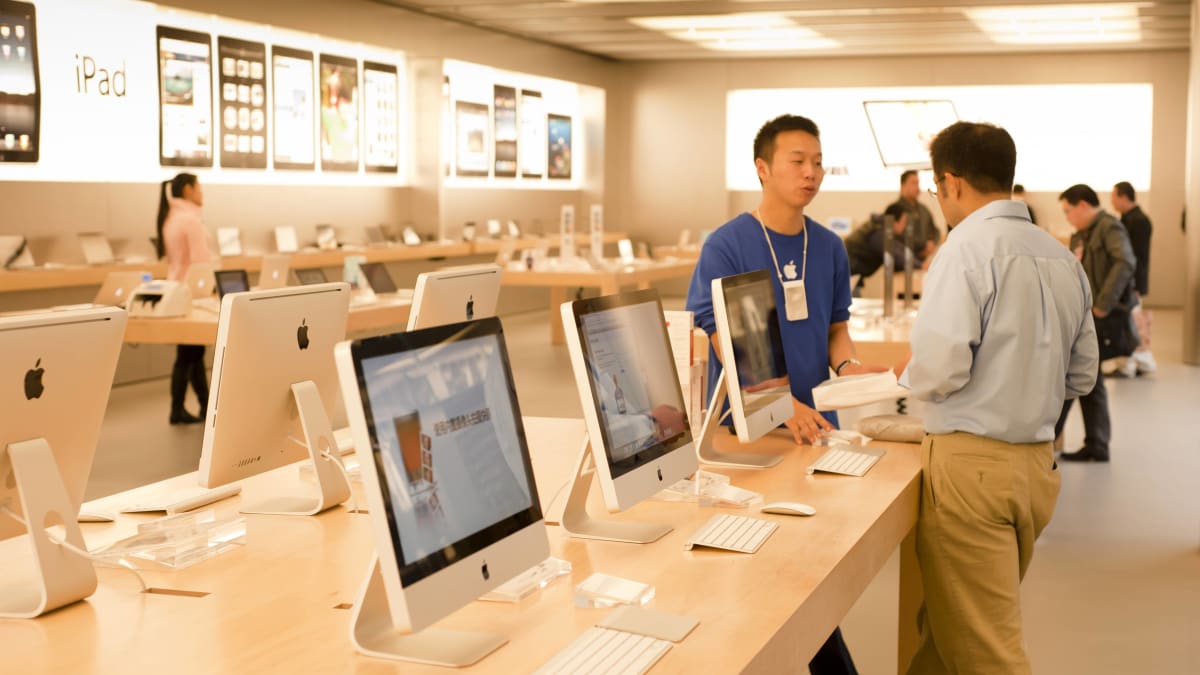
Tim Cook wants you to look closely at those numbers.
The Apple (AAPL) CEO, speaking to analysts last month during the computer giant's second-quarter earnings call, was discussing the company's results in China.
DON'T MISS: Apple Might Be Ready To Introduce This Key New Product
Apple had posted better-than-expected earnings, powered by a surprise boost in iPhone sales.
China sales, however, fell 2.9% to $17.81 billion amid an uneven post-covid recovery in the world's second-largest economy.
"If you look at China, our revenue came in at negative three for the quarter year-over-year, but we actually grew on a constant currency basis," Cook said, according to a transcript of the call, "and we also accelerated as compared to the December quarter, which, as you know, had 14 weeks in it and was a negative seven on a reported basis."
Now, as the computer giant gets ready to kick off annual Worldwide Developers Conference (WWDC) on June 5, Apple is reportedly working on plans to expand and revitalize its retail chain, aiming to push deeper into China and other parts of Asia while overhauling established locations in the US and Europe.
Revamping and Relocating Stores
Through 2027, the iPhone maker is discussing opening 15 new stores across the Asia-Pacific region, five locations in Europe and the Middle East, and four additional outlets in the U.S. and Canada, Bloomberg reported, citing people with knowledge of the deliberations.
Apple is also looking for six revamped or relocated stores in Asia, nine in Europe and 13 in North America. In total, the company is proposing 53 new, relocated or remodeled stores over the next four years.
The most notable new stores under discussion or in development include three sites in India, the company’s first outpost in Malaysia and an upgrade to Apple’s historic location in the Opera shopping area of Paris.
Apple will soon by opening a store at the Battersea Power Station in London by its new local headquarters and is planning an additional location in Miami. There is also a flagship store slated for the Jing’an Temple Plaza in Shanghai.
Some of the future locations are either internal projections or proposals, so they could be delayed or scrubbed entirely.
The company has contended with pandemic woes, customer service problems and labor unrest in recent years. Apple wants to build its brand in growth markets, such as India, while also giving consumers in the US and Europe a better experience.
The 'Parade of Horribles'
During the earnings call, Cook noted Apple's "milestone" of opening its first two stores in India, in Mumbai and Delhi.
"Looking at the business in India, we did set a quarterly record, grew very strong, double digits year-over-year," he said.
One analyst asked Cook to compare India today with China of a decade ago.
"I think each country is different and has their own journey, so I hesitate to compare too much," the CEO said. "But what I do see in India is a lot of people entering the middle class, and I'm hopeful that we can convince some number of them to buy an iPhone and we'll see how that works out. But right now, it's working out."
Cook said Apple will continue "to invest everywhere, and we'll continue to look for ways to optimize the supply chain based on what we learn each and every day and week and so forth, to ensure that we can deliver the best products and services for our customers."
"If you sort of step back and look at how we've performed over the last three years on the supply chain," he told analysts, "despite this parade of horribles, if you will, between the pandemic and the chip shortages and macroeconomic kind of factors, the supply chain has been incredibly resilient, and we feel good about what we are and what our plans are."
Apple, which did not immediately respond to a request for comment, currently has more than 520 stores in 26 countries, with roughly half of them located in the US.
Get exclusive access to portfolio managers and their proven investing strategies with Real Money Pro. Get started now.







